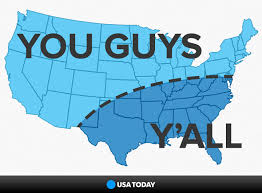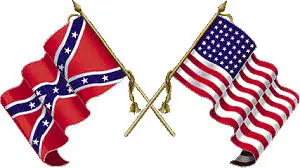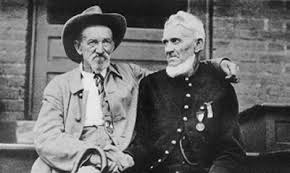Last week my wife and I visited our daughter in Nashville, Tennessee. She and her fiancé, Mike, had recently moved there, so we headed down from Ohio to “house-warm” their new home.
The new place needed some yardwork, so Mike and I made a trip to the nearest Home Depot to get a few things. While searching for drainage tile, we were approached by “Jimmy,” a store employee.
“Can I help y’all with anything?” Jimmy asked in a thick Southern drawl. He looked about 55 years old. He had big, sad eyes and a large belly that fully stretched his bright orange apron.
“Well, we’re looking for some piping to divert water from a downspout,” I said. “My daughter and her fiancé just bought a new house, and we need to fix a few things.”
“Where d’yall move from?” he asked.
“From Philadelphia,” Mike responded.
“Oh… a Yankee,” he said with just a trace of a smile.
(I felt something coming. Sure enough, it came).
“Know the difference ‘tween a Yankee and a damned Yankee?” Jimmy asked us.
“Uh… don’t know,” we answered.
“A Yankee comes down here then goes home. A damned Yankee stays!”
 Mike and I laughed. Mike then offered an olive branch by saying his original home, Maryland, was a border state. I thought about telling Jimmy that I went to a school in Pennsylvania… near Gettysburg. Then I thought that might not be a good idea.
Mike and I laughed. Mike then offered an olive branch by saying his original home, Maryland, was a border state. I thought about telling Jimmy that I went to a school in Pennsylvania… near Gettysburg. Then I thought that might not be a good idea.
Jimmy then elaborated that he actually wasn’t prejudiced. He liked everybody, no matter where they hailed from. To prove it, he waylaid us for about 10 minutes while he talked about himself.
Jimmy turned out to be really nice, and very helpful. But his “damned Yankee” joke, and his insistence that he wasn’t prejudiced toward Northerners, reminded me that, yeah… attitudes are just a little different in good ole Dixie. Victorious in the war, we Yankees don’t make North-South distinctions as often as Southerners, even in jest. I don’t think I’ve ever heard a fellow Yankee mutter the term “Damned Rebel.”
___________
The American Civil War ended 150 years ago this month. The Battle of Appomattox Court House occurred on April 9, 1865, where Confederate General Robert E. Lee surrendered to Union General Ulysses S. Grant. Lee’s capitulation created a wave of Confederate surrenders throughout the South. The last land battle, the Battle of Palmito Ranch, occurred on May 12-13. The CSS Shenandoah held out until November, when it finally waved the white flag off Liverpool, England.
In victory, Grant was magnanimous. He forbade his troops from celebrating, and his terms of surrender were generous in the extreme.
In defeat, Lee was dignified and noble. He discussed with Grant the last time they’d met, twenty years earlier, during the Mexican-American War. Following Appomattox and for the rest of his life, Lee would not allow anything unkind to be said of Grant.
There have been a lot of changes in the last 150 years: Reconstruction, industrialization, Jim Crow laws, two World Wars, civil and voting rights, a black president elected, instant mobilization and communication… Elvis. But despite our long, strange trip, there remains a gnawing resentment in some quarters. It stems from the fact that a long, bloody war was fought, and a collection of rebellious states was vanquished. Many of the descendants of those who lost the war cling to a forlorn hope their ancestors will one day be vindicated.
But the resentment is more complex. Today it’s bound up in, not only the Rebel flag, but passionate feelings about racial and ethnic diversity, religion, culture, tax policy, states’ rights versus federal regulation, immigration, health care access, etc. Sure, there are many Northerners who are just as passionate about these issues. But I don’t think it’s as visceral as down South.
A few years ago I read a great book: Confederates in the Attic by Tony Horwitz. Horwitz – a Civil War buff, a liberal, a Jew, and a Yankee – made a solo journey through the South, meeting and talking with various neo-Confederates about the war (some of whom merely had a fetish about a bygone era, but others who were full-fledged racists and xenophobes). At the end of his journey, he came to this eye-opening conclusion:
For many Southerners I’d met, remembrance of the War had become a talisman against modernity, an emotional lever for their reactionary politics…While I felt almost no ideological kinship with these unreconstructed rebels, I’d come to recognize that in one sense they were right. The issues at stake in the Civil War – race in particular – remained raw and unresolved, as did the broad question the conflict posed: Would America remain one nation?”
In the 1860s it was a regional conflict.  Today the conflict is more ideological. I don’t think America will allow itself to become ripped apart ever again. But things seem to get uglier all the time in Washington. And I see more “Don’t Tread On Me” flags lately than I care to.
Today the conflict is more ideological. I don’t think America will allow itself to become ripped apart ever again. But things seem to get uglier all the time in Washington. And I see more “Don’t Tread On Me” flags lately than I care to.
That being said, I thought Jimmy, Mike and I showed the right spirit. Like Ulysses S. Grant, Mike and I were magnanimous in laughing at Jimmy’s Yankee joke, and patiently listening to him ramble.
And I’m confident that Jimmy – similar to Robert E. Lee – will never allow anything ugly to be said about carpetbagging Yankees like us.




You must be logged in to post a comment.